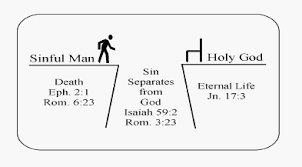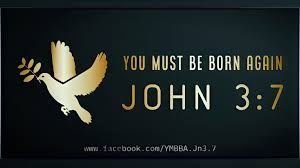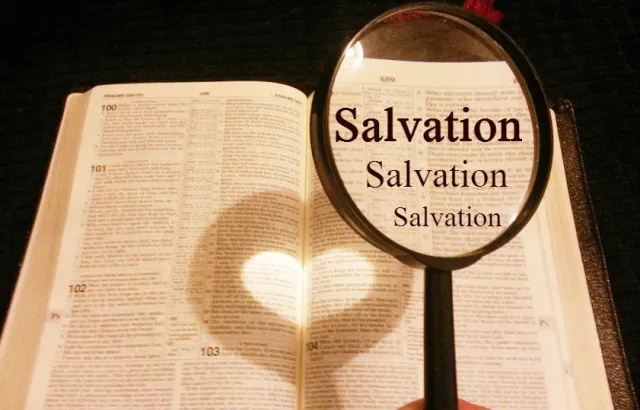Salvation is a fundamental tenet of Christianity. The ultimate goal for every Christian is salvation and eternal life. Man’s widespread need for salvation is one of the most explicit teachings of the Bible. So, what is salvation, and how is it achieved? The best answer is found in the Scriptures. This article looks at salvation and the Bible.
What is Salvation?
According to the Merriam-Webster Dictionary, the first definition is deliverance from the power and effects of sin.
Sin is any lack of conformity to the holy character of God (Rom. 3:23). The sinful nature is expressed in selfish thoughts and actions and rebellion against the will and plan of God (Jn. 3:19-20; Gal. 5:19-21). The creature expressing its will over the will of the Creator is sin because the Creator has the right of authority over His creation for His will to be done (Isa. 14:12-15; Romans 1:18-32, 8:5-8; 9:19-21).
Sin separates man from God.

The need for salvation goes back to the removal of man from the Garden of Eden (Genesis 3). After that event, man’s life was marred by strife and difficulty. Progressively, corruption and violence dominated the world (Genesis 6:11-13). When God wiped out the sin of the world with the Flood, He also executed the first act of salvation by saving Noah and his family. These eight people became the basis of another chance for humanity. The salvation of Noah and his family was viewed by the apostle Peter as a pattern of that complete salvation which we receive in Christ (1 Peter 3:18-22). Salvation is needed because humanity is depraved.
Salvation is God’s great gift and work in which He forgives sin and gives eternal life to a converted sinner as a free gift of His grace (Eph. 2:8-9). Forgiveness is needed because all people are born sinners, showing their sinful nature soon after birth (Gen. 6:5; Ps. 14:1-3; 51:5; Rom. 3:10-18). New life is needed because all people are born spiritually dead, separated from God (Rom. 5:12; Eph. 2:1-3). Having a sinful nature and being spiritually dead results in individuals being completely depraved, for they are unable to please God by the good deeds they may achieve (Isa. 64:6; Jer. 17:9; Mk. 7:20-23; I Cor. 2:14; Gal. 5:19-21). The sinner is under the just condemnation of God, who is perfect in holiness, purity, and righteousness (Ezra 9:15; Ps. 22:3; Ps. 48:10; Isa. 6:3; Jer. 9:24; Hab. 1:13) and must judge sin (Ezek. 18:4; Acts 17:30-31; Rom. 6:23).
Sin is any lack of compliance with God’s holy character and will. Our sinful nature is expressed in selfish thoughts and actions and rebellion against the will and plan of God. It is transgression against the law of God. 1 John 3:4 reads, “Whosoever committeth sin transgresseth also the law: for sin is the transgression of the law.”
God loves all people and desires them to be with Him, but He cannot tolerate sin and sinners in His presence because of His holiness and righteousness. He loves the sinner, but hates sin. Therefore, He must and will condemn and judge sin. The penalty for sin is death, both physical and spiritual (Gen. 2:16-17; Ezek. 18:4; Rom. 6:23). Physical death is separation from life in this world; spiritual death is separation from God. Sinners are unable to die for their sins and live and are unable to make themselves acceptable to God by any works of righteousness (Isa. 64:6; Rom. 8:7-8; Tit. 3:5). Consequently, God’s righteous justice must be satisfied another way. Because of His love, mercy, and grace (1 Jn. 4:8), God conceived a plan to pay the price Himself to save and make people right before Him and welcome them in His presence.

To accomplish this plan, God sent His Son to be joined to humankind (Jn. 1:1-2, 14). This plan commenced with the virgin birth of Jesus Christ, conceived by the Holy Spirit (Matt. 1:20-23). The plan included Jesus dying on the cross as a replacement for all sinners (Ps. 22:1, 11-18; Isa. 53:3-12; Rom. 5:6-8). Jesus, who had no sin of His own, permitted all sins to be placed upon Himself (2 Cor. 5:21; 1 Pet. 2:21-24). He evidenced being separated from God in the words, spoken from the cross, “Why have you forsaken me” (Matt. 27:46). His words, “It is finished,” declared the payment to be completed (Jn. 19:30). His resurrection from the dead three days later proved that sin and death had been conquered, the price fully paid (Rom. 4:25; 1 Cor. 15:3-5, 20-23). His separation from God in death and the shedding of His blood paid the redemption price (Eph. 1:7), fully satisfying God’s righteous justice (1 Jn. 2:1-2) and providing the basis for sinners to be reconciled to God (2 Cor. 5:18-19). His death rendered propitiation for the sins of humanity.
This is what salvation is all about. God’s plan of salvation is open to all to be saved from eternal death to eternal life.
To be Saved or Lost, which is easier?
This, indeed, is an interesting question. As usual, one only needs to consult the Scriptures. As mentioned earlier, sin entered the world through the fall of man in the Garden of Eden. After that, all of humanity is stained with a sinful nature. Rom. 5:12 NKJV reads, “Therefore, just as through one man sin entered the world, and death through sin, and thus death spread to all men, because all sinned.” Therefore, from birth, we are lost. A child never has to be taught to do wrong. They do wrong automatically and must be trained and guided to do what is right. However, even with this guidance, children grow up with a propensity to sin because we have a spirit of disobedience (Eph. 2:2) until we accept Christ as our Lord and Savior.
This is why Jesus said in John 3:3-7
3. Verily, verily, I say unto thee, Except a man be born again, he cannot see the kingdom of God.
4. Nicodemus saith unto him, How can a man be born when he is old? can he enter the second time into his mother’s womb, and be born?
5. Jesus answered, Verily, verily, I say unto thee, Except a man be born of water and of the Spirit, he cannot enter into the kingdom of God.
6. That which is born of the flesh is flesh; and that which is born of the Spirit is spirit.
7. Marvel not that I said unto thee, Ye must be born again.

Since we are born lost, it is easier to be lost because we are lost by default—automatically.
Understand that it is Satan’s objective to keep us lost. It is Satan’s influences that keep us in a lost state. Ephesians 2:2 refers to him as “the prince of the power of the air.” Jesus referred to him as the “prince of this world” (John 12:31, 14:30, 16:11). This perpetual influence makes it difficult for individuals to be saved.
Jesus makes this clear in the passage of Matt 7:13-14 NKJV:
13. “Enter by the narrow gate; for wide is the gate and broad is the way that leads to destruction, and there are many who go in by it.
14. Because narrow is the gate and difficult is the way which leads to life, and there are few who find it.

At some point in our lives, we are faced with a choice of which path to continue. We are already on the broad road from birth. Therefore, it is easy to remain on that path, the broad road to destruction through the wide gate.
This gate leading to life is narrow, not because it is difficult to become a Christian but because accepting and trusting in Jesus is the only way to eternal life. Only one way exists, and only a few choose to walk that road.
It is also “difficult” to stay on the narrow road because “the prince of the power of the air” and “the prince of this world” are constantly warring against us so that we stray off the course. This circumstance is spiritual warfare that every human being is involved in. It is especially trying for Christians traveling the narrow road to life. It may be easy for an individual to become a Christian and follow Christ once they decide to do so. However, it can become increasingly difficult to remain one.
The road is hard to travel because genuine discipleship calls for surrender and servanthood. The fact is that following the crowd along life’s easy path results in destruction. Deciding to travel the narrow way of difficulty and sacrifice will finally lead to eternal life.
It is important to note that if we make no choice, we remain on the broad road to destruction. Jesus said in Matt 12:30 NKJV, “He who is not with Me is against Me, and he who does not gather with Me scatters abroad.”
It is impractical to be neutral about Christ. Any individual not vigorously following Him has automatically chosen to reject him. Any individual who attempts to remain neutral in the struggle of good against evil chooses to be separated from God, who alone is good. “No man can serve two masters” Matthew 6:24. To refuse to follow Christ is to choose to be on Satan’s team.
It’s easier to be lost, but much better to be saved!
Amen
Questions, comments, and concerns may be left below.
Blessings!
